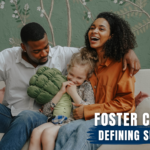
Every single one of us wants to feel seen and valued. This is especially true for a child, or family, that may be walking through life feeling unseen in the dark shadow of their challenging circumstances. Our words, even when intended to be positive, can unintentionally exclude or dismiss people. Unfortunately, those who feel different or marginalized are more likely to notice and feel the brunt of this verbal exclusion.
To ensure every child feels seen and heard, one of our goals at CASA is to conduct respectful advocacy. There are two methods we prioritize when we communicate – both verbally with children and their families and within our written reports for the Court.
- Inclusive Language
We are sensitive to each of our differences. Using inclusive language allows us to convey respect to everyone. It also avoids words and phrases that can exclude a person or group. Inclusive language seeks to include everyone.
An example of inclusive language is the phrase ‘family of origin.’ This replaces the common phrase ‘birth family’ that excludes many types of families. ‘Family of origin’ more broadly encompasses many family structures, including biological families, single parents, blended families, and same-sex parents. - People-First Language
We want to highlight people as individuals before we potentially associate them with a group, situation or condition that could possibly define them. Prioritizing an individual with our words conveys their value and hopefully prevents subconscious dehumanization.
People-first language is often used to describe individuals with disabilities. For instance, instead of saying ‘an autistic child’ it is preferable to say ‘a child with autism.’ Emphasizing a person, first, can be used beyond describing health conditions. Additional examples include saying ‘a child in foster care’ instead of ‘a foster child’ or ‘a person with a substance abuse disorder’ in place of ‘an addict.’ This small swap in the order of words makes a big difference in perceived value.
CASA strives to show value to every person we interact with on a case. Click to learn more about our respectful, best-interest advocacy.








